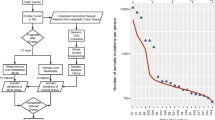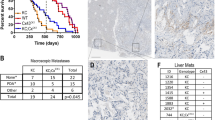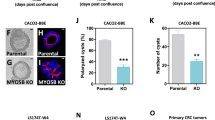Abstract
The membrane-spanning connexin proteins form microscopic intercellular channels that directly connect the cytoplasms of adjacent cells and as such have been implicated in maintenance of tissue homeostasis. They are considered to act as tumor suppressors since their function or expression is frequently aberrant in tumor cells. Several mechanisms appear to be involved in this, but irreversible mutational alterations have not yet been proved to be among them. In this study we have demonstrated for the first time that connexin 43 but not connexin 32 is specifically and quite frequently mutated in human colon sporadic adenocarcinomas. All tumor-associated mutations led to a shift of reading frame and were located in the multifunctional carboxyl-terminal domain of the protein. Expression of mutated connexin 43 protein was restricted to invasive structures of tumors. These findings suggest that mutational alterations of connexin 43 are involved in advanced stages of progression of human colon cancer towards malignancy.
This is a preview of subscription content, access via your institution
Access options
Subscribe to this journal
Receive 50 print issues and online access
$259.00 per year
only $5.18 per issue
Buy this article
- Purchase on Springer Link
- Instant access to full article PDF
Prices may be subject to local taxes which are calculated during checkout



Similar content being viewed by others
References
Ai Zh, Fischer A, Spray DC, Brown AM, Fishman GI . 2000 J. Clin. Invest. 105: 161–171
Bergoffen J, Scherer SS, Wang S, Scott MO, Bone LJ, Paul DL, Chen K, Lensch MW, Chance PF, Fischbeck KH . 1993 Science 262: 2039–2042
Britz-Cunningham SH, Shah MM, Zuppan CW, Fletcher WH . 1995 N. Engl. J. Med. 332: 1323–1329
Fishman GI, Edy RL, Shows TB, Rosental L, Leinward LA . 1991 Genomics 10: 250–256
Giepmans BN, Moolenaar WH . 1998 Curr. Biol. 8: 931–934
Jamieson S, Going JJ, D'Arcy R, George WD . 1998 J. Pathol. 184: 37–43
Jin Ch, Lau AF, Martyn KD . 2000 Methods 20: 219–231
Krutovskikh V, Mazzoleni G, Mironov N, Omory Y, Aguelon A-M, Mesnil M, Berger F, Partensky C, Yamasaki H . 1994 Int. J. Cancer 56: 87–94
Krutovskikh V, Mironov N, Yamasaki H . 1996 Carcinogenesis 17: 1761–1763
Krutovskikh V, Troyanovsky SM, Piccoli C, Tsuda H, Asamoto M, Yamasaki H . 2000 Oncogene 19: 505–513
Krutovskikh V, Yamasaki H . 2000 Mut. Res. 462: 197–207
Mesnil M, Krutovskikh V, Piccoli C, Elfgang C, Traub O, Willecke K, Yamasaki H . 1995 Cancer Res. 55: 629–639
Nelis E, Haites N, Van Broeckhoven C . 1999 Human Mutation 13: 11–28
Neveu MJ, Hully JR, Babcock KL, Hetzberg EL, Nicholson BJ, Paul DL, Pitot HC . 1994 J. Cell. Sci. 107: 83–95
Lamartine J, Munhoz Essenfelder G, Kibar Z, Lanneluc I, Callouet E, Laoudj D, Lemaitre G, Hand C, Hayflick SJ, Zonana J, Antonarakis S, Radhakrishna U, Kelsell DP, Christianson AL, Pitaval A, Der Kaloustian V, Fraser C, Blanchet-Bardon C, Rouleau GA, Waksman G . 2000 Nat. Genet. 26: 142–144
Lampe PD, Lau AF . 2000 Arch. Biochem. Biophys. 384: 205–215
Richard G, Smith LE, Bailey RA, Itin P, Hohl D, Epstein Jr EH, DiGiovanna JJ, Compton JG, Bale SJ . 1998 Nat. Genet. 20: 366–369
Saito T, Krutovskikh V, Marion M, Ishak K, Bennett W, Yamasaki H . 2000 Int. J. Cancer 86: 67–70
Saito T, Barbin A, Omori Y, Yamasaki H . 1997 Cancer Res. 57: 375–377
Stergiopoulos K, Alvarado JL, Mastroianni M, Ek-Vitorin JF, Taffet SM, Delmar M . 1999 Circ. Res. 84: 1144–1155
Toyofuku T, Shah MM, Zuppan CW, Fletcher WH . 1998 J. Biol. Chem. 273: 12725–12731
White TW, Deans MR, Kelsell DP, Paul DL . 1998 Nature 394: 630–631
Wilgenbus KK, Kirkpatrick CJ, Knuechel R, Willecke K, Traub O . 1992 Int. J. Cancer 51: 522–529
Xia JH, Liu CY, Tang BS, Pan Q, Huang L, Dai HP, Zhang BR, Xie W, Hu DX, Zheng D, Shi XL, Wang DA, Xia K, Yu KP, Liao XD, Feng Y, Yang YF, Xiao JY, Xie DH, Huang JZ . 1998 Nat. Genet. 20: 370–373
Yamasaki Y, Naus CC . 1996 Carcinogenesis 17: 1199–1213
Acknowledgements
We thank Dr J Cheney for editing the manuscript. We also thank Mr A Panchenko and Mr E Feodorov for their help in collection of samples and Dr O Sinilnikova for helpful discussions. This work was supported in part by the Ministry of Public Health of the Russian Federation. MV Dubina was a recipient of an ICRETT fellowship from the International Union Against Cancer (#157, 02.02.2000).
Author information
Authors and Affiliations
Corresponding author
Rights and permissions
About this article
Cite this article
Dubina, M., Iatckii, N., Popov, D. et al. Connexin 43, but not connexin 32, is mutated at advanced stages of human sporadic colon cancer. Oncogene 21, 4992–4996 (2002). https://doi.org/10.1038/sj.onc.1205630
Received:
Revised:
Accepted:
Published:
Issue Date:
DOI: https://doi.org/10.1038/sj.onc.1205630
Keywords
This article is cited by
-
Roles of connexins and pannexins in digestive homeostasis
Cellular and Molecular Life Sciences (2015)
-
Ablation of connexin43 in smooth muscle cells of the mouse intestine: functional insights into physiology and morphology
Cell and Tissue Research (2006)
-
Overexpression of estrogen receptor-α gene suppresses gap junctional intercellular communication in endometrial carcinoma cells
Oncogene (2004)
-
The relationship between connexins, gap junctions, tissue architecture and tumour invasion, as studied in a novel in vitro model of HPV-16-associated cervical cancer progression
Oncogene (2003)



